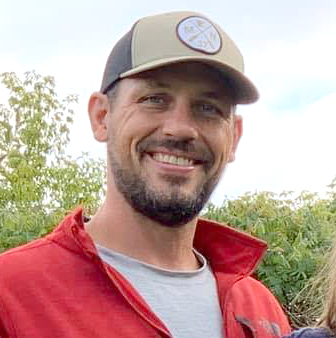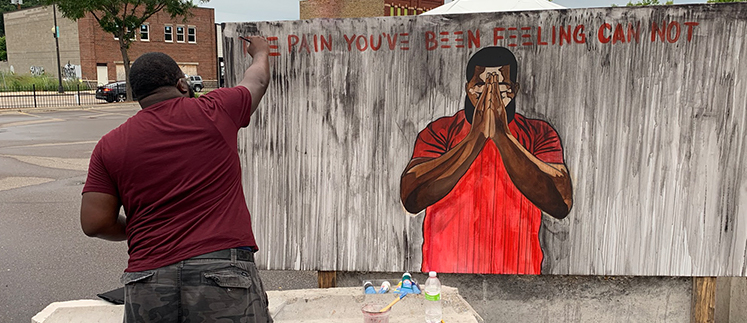From Hostility to Hospitality
 By Aaron Brockmeier
By Aaron Brockmeier
Pastor, Faith Baptist Church
The Gospel has been summarized as the movement from hostility with God to hospitality. At Faith Baptist Church, the staff and leadership are having an ongoing conversation about how to model the Gospel and show hospitality to the community.
At Faith, we work hard to demonstrate hospitality to our community and desire that all know they are invited into our church. I thought this was the full vision of biblical hospitality we needed to have, but recent events are teaching me that it is not enough to simply invite others in. What should cause the bigger celebration, that a neighbor chooses to respond and come into our church as a guest or that we are invited into a home in our community to be a guest? The former is often a place of power and comfort, and the latter is a step of vulnerability and relationship.
To truly be in relationship with someone entails being invited into the truth of their life – their pain, their hopes, their dreams. It is when you are invited as a guest into their story that you can listen and care.
In May, I was at lunch at a Black friend’s house when reports were just starting to surface about the brutal police violence by four Minneapolis officers against George Floyd. His life was taken through a denial of his right to breathe. Over this lunch, I was invited again to hear the deep issue of systemic racism – including the past ideas and power that created the race-based inequality in America and the present situation that continues to perpetuate it – and the responsibility of the church to address it. It was hearing from my new friend, combined with the increasing racial tension in the Twin Cities, that made visible the deep issues still within our society, the church, and my own heart that need to be addressed. And in order to be addressed, we need to leave our place of comfort.
Dr. Luke Bobo, a man I consider a mentor, tells the story of moving into his current neighborhood in Kansas City, Missouri, in the 1980s. He was required to have verbal consent from his adjacent neighbors to move into the community because of the restricted covenants that existed.[1] Dr. Bobo also tells the more recent story of taking his ID and cell phone with him when he goes to fix the other side of his fence. The fence could be reached by walking through his neighbor’s backyard or by taking the sidewalk for a longer stretch. He invited us to consider what he was thinking by walking around instead of cutting through his neighbor’s yard and by making sure he has his ID and cell phone with him.
Both stories Dr. Bobo shares are strange to me. I’ve never needed to be allowed by my neighbors to buy a home in a place I desire. I transverse freely throughout my neighborhood and city, not fearing the neighbors I don’t know. The stories are strange to me because, unlike Dr. Bobo, I’ve never been an outsider; I am White.
My fellow Twin Cities pastor Rev. Brian Herron says the African American community are “used to being on the outside.”[2] I am realizing how far I am disconnected from the present experience of so many, as the tragedy of George Floyd’s death falls in a larger narrative that stretches over four centuries of horrendous atrocities against Blacks. This began with slavery and continues to the present with the gut-wrenching deaths of Breonna Taylor, Ahmaud Arbery, and so many other black women and men unjustly killed.[3] The depth of suffering, pain, and injustice in this story is more than most can handle. To even listen to it requires leaving your comfort zone.
I am thankful for the hospitality that continues to be shown to me by brothers and sisters of color who personally invite me – a stranger – into their stories, even though many grow weary of sharing and living it.
One example was during the week of George Floyd’s memorial service. I was invited by a Black pastor from a church in our neighborhood to take some time together in prayer. He and I have been meeting for years, talking about getting our churches together in partnership. As we spent time in prayer, in Scripture, and listening together, we asked, “Lord, what is our next step forward together?”
God made it clear that we are to follow in the path of relationship. Early in June, we began meeting together weekly for prayer with some leaders from each of our churches. We’ve alternated which church hosts each week as more individuals from each of our churches have joined us, as well as some members of another primarily White church from the suburbs.
During this time of prayer, myself and those at Faith have been invited into deeper relationship with our neighbors as we hear the praise, confession, and requests of each other. We stand in prayer together through the unity of the Gospel. We are opening our lives up to each other, rejoicing and weeping together.
In a poignant instance of this a few weeks ago, one of the deacons from the predominantly black church started prayer time by sharing about being followed by a police officer to our time of prayer. He shared that he prayed to God for protection and to help him stay calm. We praised God with him that his fear was replaced with rejoicing when the officer just warned him for going the speed limit – “too slow.” We also lamented in prayer that this is an actual fear in our community and city for Black men and women.
In July, Faith was invited by our friends to join with them in a thirty-day movement called Healing Our City organized by a former city council leader. Each day was hosted by an African American church. We joined with our friends for two Saturdays, taking time together to silently pray for eight minutes and forty-six seconds and pray for our Twin Cities.
Today, tensions continue to increase in the Twin Cities. Racial discrepancies grow. Systemic racism is being made more and more clear. Frustration with the government is rising. And this fall, we will continue to pray.
We have been invited as guests into the lives of those who have a story of deep injustice and suffering. Love is demonstrated by staying in the relationship, not leaving when it gets hard. It would be easier to go back to what is comfortable, where the stories are strange because we don’t know our neighbors who are sharing them. But hospitality is staying to love when you are invited in.
__________________________________________
Don’t forget to register for the November 19 webinar with Aaron Brockmeier; Wayne Stapleton, VP of Cross-Cultural Engagement; and Chris Gorman, regional minister for the Northwest. We are eager to share this hour with you as we all seek to reflect the ways of Christ by listening together to the experiences of others within the NAB family. Feel free to submit any questions.
__________________________________________
[1] See https://www.youtube.com/watch?v=qY_J249vML0&t=2315s. I also highly recommend his book Race, Economics, and Apologetics: Is There a Connection?
[2] https://churchanew.org/blog/posts/pastor-brian-herron-policing-and-the-church-interview
[3] Just Mercy by Brian Stevenson teaches how unjust black deaths occur even through the criminal justice system.
